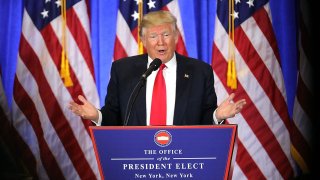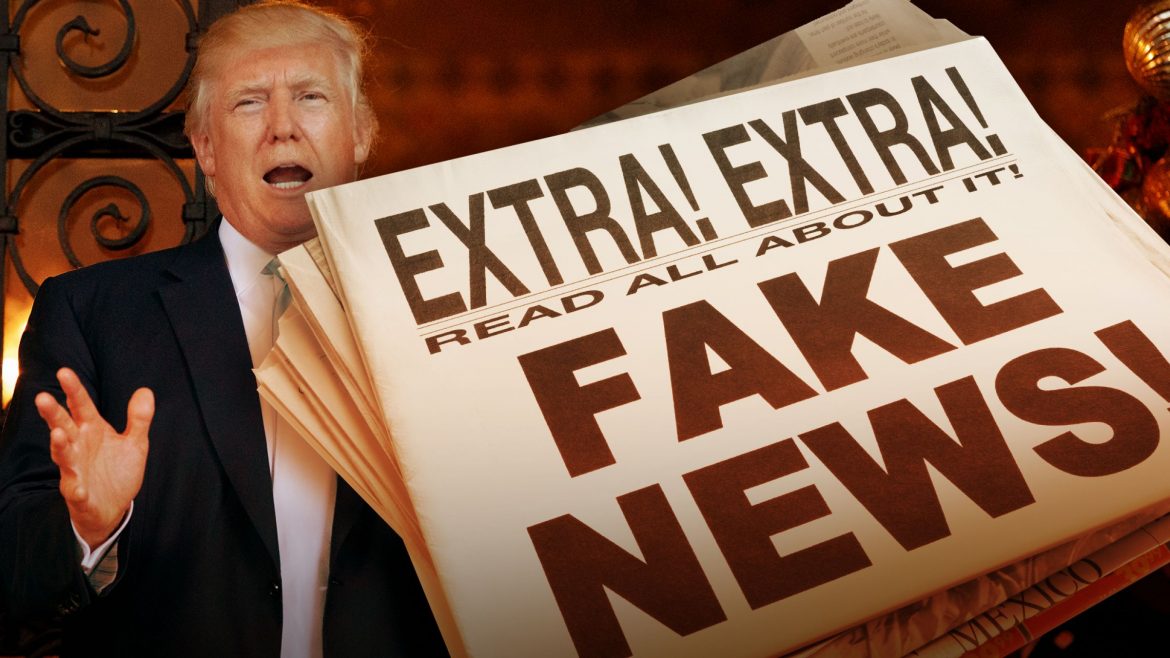All news contains an implicit interpretation of the world—a worldview. And worldviews, however accurate, are essentially constructed, made up. In this sense, all news is “fake news.”
As established narratives and accepted truths have broken down, professional journalists have been trying to return to “the facts.” However facts are embedded in shared narratives and accepted truths.
What’s happening in our age is that the formerly ruling worldviews no longer obtain and compel. The corporate media can lament that all they like; the situation is not going to revert to status quo ante. It will only worsen until it is adequately addressed.
The mainstream media is stuck on the highest (or rather lowest) expression of the new reality, President Trump, who “seems virtually indifferent to reality, often saying whatever helps him make the case he’s trying to make.”
 It isn’t just that “Trump is trying to make truth irrelevant…which is extremely damaging to democracy, and is the core of his political strategy.” Nor is it that “the Republican Party has become an extremist institution with little respect for traditional norms of any kind,” as true as both of these statements are.
It isn’t just that “Trump is trying to make truth irrelevant…which is extremely damaging to democracy, and is the core of his political strategy.” Nor is it that “the Republican Party has become an extremist institution with little respect for traditional norms of any kind,” as true as both of these statements are.
It’s that previously dominant notions of democracy, and indeed of reality itself, have collapsed, and conspiracies, misinformation and outright lies are filling the vacuum.
In short, the mainstream media is still fighting rear guard actions when it has already lost the war. The “World’s Paper of Record,” as the New York Times like to be referred to, has taken to using the truth to deny the truth. That’s a trick even the slickest lawyer has a difficult time mastering.
For example, in a front-page article entitled, “Fake News, Trump’s Obsession, Is Now a Cudgel for Strongmen,” the Times cunningly intones, “Mainstream media is portrayed as an arrogant, out-of-touch elite, who use that tool to keep down the marginalized.”
I couldn’t have put it better myself. That’s exactly what they have been, and exactly what they have done. Of course, it’s a clever attempt to preempt the truth from affecting them.
But it won’t work. The proverbial cat is out of the bag. The Times and Washington Post, much less MSNBC, CNN or that more blatant state organ of propaganda, Fox News, are no longer the authorities on reality. They’ve become merely sources of information and entertainment.
The “fake news” problem is a philosophical conundrum, the locus of which is not within the same old journalistic humdrum. Journalists and editors, who necessarily operate on a day-to-day basis with news and commentary, are not equipped to deal with underlying questions of shared narratives, much less accepted truths.
So the crisis of journalism is not the crisis of facts vs. “fake news;” it’s the crisis of narratives that were once accepted as valid. Across the political spectrum, there are no more accepted narratives. That’s what the “post-truth era” really means. We don’t live in a post-truth era; we live in a post-narrative era. An entirely new approach to truth is required.
The crisis is not just limited to the United States. The Peoples Daily, the official newspaper of the Chinese Communist Party, is jumping on the “fake news” bandwagon: “If the president of the United States claims that his nation’s leading media outlets are a stain on America, then negative news about China and other countries should be taken with a grain of salt, since it is likely that bias and political agendas are distorting the real picture.”
That too is clever as hell, since there is no news without “bias and political agendas,” and it’s extremely rare for anyone not to “distort the real picture.” That’s what we do as humans, to one degree or another.
So the ordered fictions of the old narratives have collapsed, and been temporarily replaced by crude manipulations of propaganda and disordered fantasies of so-called populism. As Gramsci stated: “The crisis consists precisely in the fact that the old is dying and the new cannot be born; in this interregnum a great variety of morbid symptoms appear.”
The situation is temporary because if it is not adequately addressed, fantasy and conspiracy will give way to outright authoritarianism and violence as surely as night follows day.
Generally speaking, we don’t perceive reality; we interpret reality. Can we perceive things directly, without interpretation? Most philosophers say no, that humans are inescapably “hermeneutical.”
But that too isn’t true. Though we can never say with absolute certainty how things are and what “the real picture” is, we can see things as they are.
But only if we realize that the truth is never fixed, and can only be perceived in the present by continuously questioning what we think and perceive.
Martin LeFevre

